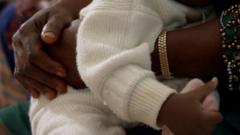Chioma is adamant about her claims; baby Hope, the infant she holds, is her son, her long-awaited miracle after years of unsuccessful attempts to conceive. The couple, sitting in a tense meeting with Anambra state's commissioner for women affairs, Ify Obinabo, faces disbelief from family members who question the legitimacy of Hope being their biological child. Chioma alleges she carried him for an astounding 15 months, a statement met with skepticism from the official and their relatives.
Nigeria's high birth rates and societal pressure to have children culminate in extreme measures by women seeking motherhood. In a chilling investigation by BBC Africa Eye, it was revealed that scammers deceive vulnerable women desperate for children, offering fake miracle fertility treatments that lead to human trafficking. These fraudsters either masquerade as medical professionals or prey upon women’s insecurities, charging exorbitant fees for supposed treatments that are nothing more than scams.
Authorities allowed BBC to observe the commissioner’s interrogation of Chioma as part of an extensive probe into the cryptic pregnancy phenomenon. Women end up subjected to bizarre rituals promising successful pregnancies, often resulting in physical changes that validate their false beliefs. Chioma explained her “delivery” in haunting terms, detailing painful experiences that culminate in her obtaining baby Hope.
The BBC team managed to infiltrate a clinic run by an individual known as "Dr. Ruth" in Ihiala, Anambra. On arrival, they witnessed a stream of women seeking reassurance amidst an unsettling atmosphere where they believed they were among the lucky ones. Dr. Ruth constantly reassured clients by promising guaranteed pregnancy via unscientific methods and dubious treatments that can lead to deceptive ultrasounds and fake results.
This rampant misinformation feeds into widespread disinformation networks on social media, where discussions of cryptic pregnancies frequently occur, fostering bond and community among its members. Following their interactions with these groups, scammers exploit women’s hopes, drawing them into a deceptive operation where the end goal often involves selling unwanted babies.
The sinister practices further unravel with reports of raids on these clandestine clinics that house pregnant women, some coerced and fearing for their lives, unaware that their newborns would be sold. Individuals like Uju express profound confusion, seduced by the promise of financial gain under coercive circumstances.
As the commissioner interrogates Chioma, the tension escalates. At first, it appears that baby Hope might be taken away, but ultimately, she recognizes Chioma as a victim of the scam rather than a malicious perpetrator. This episode highlights the larger societal issues surrounding women's reproductive rights and underscores the need for comprehensive reforms to combat such scams.
In a world where misinformation thrives, targeted efforts are necessary to dismantle these disturbing fraud networks and help protect vulnerable women from manipulation. As the pressures surrounding motherhood continue to grow, so too does the potential for such scams, emphasizing the need for systemic change in Nigeria's societal attitudes towards infertility and adoption.



















